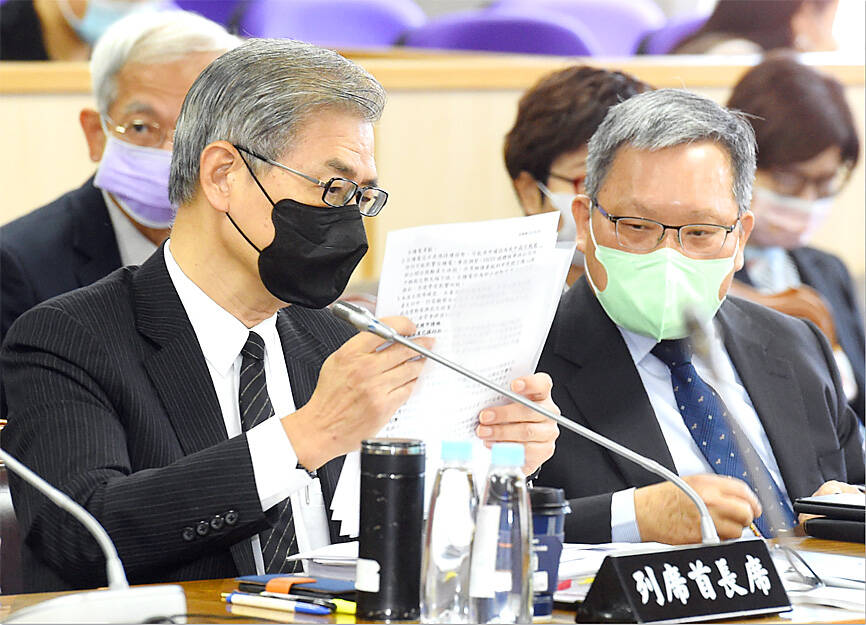The Financial Supervisory Commission does not plan to end its ban on short-selling local stocks, despite a recent TAIEX rebound, as US monetary policy remains on a tightening trajectory, comission Chairman Thomas Huang (黃天牧) said yesterday.
“It has not been one month since the short-selling ban was implemented. Now is not the time to remove it, ” Huang told a meeting of the legislature’s Finance Committee in Taipei.
The commission is to continue monitoring how global financial markets fare and how foreign regulators set their monetary policies, at least until the US Federal Reserve’s next rate hike, Huang said.

Photo: Chu Pei-hsiung, Taipei Times
US stocks rallied last week after the latest US inflation reading showed an increase last month that was slower than expected.
The rally was the result of investor relief about inflation, but does not foretell a change in US monetary policy, Huang said.
The TAIEX closed above 14,000 points on Friday and continued advancing yesterday, which Huang said reflected investors’ confidence in Wall Street along with an improved outlook for certain local industries.
However, the commission needs to observe market trends for a while longer before deciding whether to end the short-selling ban, he said.
“Whether the TAIEX has surpassed a specific level, such as 14,000 points, is not the deciding factor. We care more about is whether local stocks have truly stabilized,” Huang said.
When the commission implemented similar measures in previous years to stabilize local stocks, it lifted the controls only when local stocks had stabilized over a longer period, he said.
Meanwhile, the government’s NT$500 billion (US$16.07 billion) National Stabilization Fund is to continue lending support to local equities, Minister of Finance Su Jain-rong (蘇建榮) told the same meeting yesterday.
Four issues would be deciding factors regarding when the fund should be withdrawn: the Fed’s pace of rate hikes, trade tensions between the US and China, the war in Ukraine and China’s strict COVID-19 prevention measures, Su said.
The ministry is to discuss whether the fund should exit the market at its next quarterly meeting, he said.
The National Stabilization Fund has been supporting local stocks since July 13, the eighth time it entered into the market, ministry data showed.

HANDOVER POLICY: Approving the probe means that the new US administration of Donald Trump is likely to have the option to impose trade restrictions on China US President Joe Biden’s administration is set to initiate a trade investigation into Chinese semiconductors in the coming days as part of a push to reduce reliance on a technology that US officials believe poses national security risks. The probe could result in tariffs or other measures to restrict imports on older-model semiconductors and the products containing them, including medical devices, vehicles, smartphones and weaponry, people familiar with the matter said. The investigation examining so-called foundational chips could take months to conclude, meaning that any reaction to the findings would be left to the discretion of US president-elect Donald Trump’s incoming team. Biden

Intel Corp chief financial officer Dave Zinsner said that a formal separation of the company’s factory and product development divisions is an open question that would be decided by the chipmaker’s next leader. Zinsner, who is serving as interim co-CEO following this month’s ouster of Pat Gelsinger, made the remarks on Thursday at the Barclays technology conference in San Francisco alongside co-CEO Michelle Johnston Holthaus. Intel’s struggles to keep pace with rivals — along with its deteriorating financial condition — have spurred speculation that the next CEO would make dramatic changes. That has included talk of a split of the company’s manufacturing

HOUSING: The uptick to 2.24 percent came despite the central bank leaving its policy unchanged for two quarters and raising lenders’ required reserve ratios Mortgage interest rates last quarter spiked to a 15-year high of 2.23 percent despite a decline in loan applications, as local lenders slowed real-estate lending to support the central bank’s credit controls, Taiwan Realty Co (台灣房屋) said yesterday. “The data suggests that buying a home is growing increasingly difficult,” the brokers said, citing data from the Joint Credit Information Center (聯徵中心). The uptick in mortgage burdens came even though the central bank left its policy rates unchanged in the past two quarters and hiked the lenders’ required reserve ratios to drain money from the market, head researcher Charlene Chang (張旭嵐) said. Further, the

In a patch of South America rich in lithium, used to make batteries for electric cars and other tech, Bolivia is lagging its neighbors in the race to mine the key metal. An area called the “lithium triangle” which spills over the borders of Bolivia, Chile and Argentina is home to 60 percent of the world’s lithium reserves, according to the US Geological Survey. Bolivia claims to have Earth’s largest deposit of the metal, used to make rechargeable batteries for smartphones, laptops and other devices besides e-vehicles. However, Bolivia has undertaken only four pilot projects and is running just one